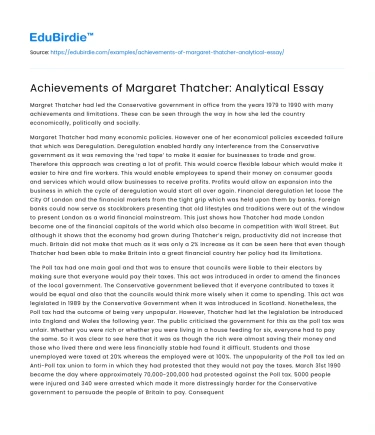Margret Thatcher had led the Conservative government in office from the years 1979 to 1990 with many achievements and limitations. These can be seen through the way in how she led the country economically, politically and socially.
Margaret Thatcher had many economic policies. However one of her economical policies exceeded failure that which was Deregulation. Deregulation enabled hardly any interference from the Conservative government as it was removing the ‘red tape’ to make it easier for businesses to trade and grow. Therefore this approach was creating a lot of profit. This would coerce flexible labour which would make it easier to hire and fire workers. This would enable employees to spend their money on consumer goods and services which would allow businesses to receive profits. Profits would allow an expansion into the business in which the cycle of deregulation would start all over again. Financial deregulation let loose The City Of London and the financial markets from the tight grip which was held upon them by banks. Foreign banks could now serve as stockbrokers presenting that old lifestyles and traditions were out of the window to present London as a world financial mainstream. This just shows how Thatcher had made London become one of the financial capitals of the world which also became in competition with Wall Street. But although it shows that the economy had grown during Thatcher’s reign, productivity did not increase that much. Britain did not make that much as it was only a 2% increase as it can be seen here that even though Thatcher had been able to make Britain into a great financial country her policy had its limitations.
Save your time!
We can take care of your essay
- Proper editing and formatting
- Free revision, title page, and bibliography
- Flexible prices and money-back guarantee
The Poll tax had one main goal and that was to ensure that councils were liable to their electors by making sure that everyone would pay their taxes. This act was introduced in order to amend the finances of the local government. The Conservative government believed that if everyone contributed to taxes it would be equal and also that the councils would think more wisely when it came to spending. This act was legislated in 1989 by the Conservative Government when it was introduced in Scotland. Nonetheless, the Poll tax had the outcome of being very unpopular. However, Thatcher had let the legislation be introduced into England and Wales the following year. The public criticised the government for this as the poll tax was unfair. Whether you were rich or whether you were living in a house feeding for six, everyone had to pay the same. So it was clear to see here that it was as though the rich were almost saving their money and those who lived there and were less financially stable had found it difficult. Students and those unemployed were taxed at 20% whereas the employed were at 100%. The unpopularity of the Poll tax led an Anti-Poll tax union to form in which they had protested that they would not pay the taxes. March 31st 1990 became the day where approximately 70,000-200,000 had protested against the Poll tax. 5000 people were injured and 340 were arrested which made it more distressingly harder for the Conservative government to persuade the people of Britain to pay. Consequently, this Poll tax showed the true colours of Margret Thatcher. Yes, she made changes to the economy as it grew greatly in finance however it was unpopular with the public. It was clear to see how she had no connection with ordinary people as when the election came upon Britain, popularity tolls began to decline for the Conservative government. This act had even brought party conflicts over the economic policy as Sir Geoffrey Howe, Thatcher’s longest-serving cabinet minister, resigned from the government. Michael Heseltine, who was Margret Thatcher’s successor had challenged her for the PM position. Thatcher had unfortunately lost the first ballot. Due to this, she resigned from government as it was her party that also made it clear to her that she would not win against him. This implied the downfall of her legacy. It is evident here that Margret Thatcher’s achievement was limited as she did not take into consideration the difficulty it would take to implement the Poll tax and how much opposition she would receive from it due to ignoring her office and the public.
Thatcher possessed the objective to turn Britain into a ‘property-owning democracy’. Accordingly, during 1980, the Housing act was introduced although council residency had always been in place it became more popular when the Conservative government reintroduced it. This enabled council renters to purchase their council residencies. In 1988, about 2 million people took the social gain to buy the homes they used to rent. This became a key policy in conservative government and also presented Thatcherism to be going well.
Did you like this example?
Make sure you submit a unique essay
Our writers will provide you with an essay sample written from scratch: any topic, any deadline, any instructions.
Cite this paper
-
APA
-
MLA
-
Harvard
-
Vancouver
Achievements of Margaret Thatcher: Analytical Essay.
(2022, December 27). Edubirdie. Retrieved December 25, 2024, from https://edubirdie.com/examples/achievements-of-margaret-thatcher-analytical-essay/
“Achievements of Margaret Thatcher: Analytical Essay.” Edubirdie, 27 Dec. 2022, edubirdie.com/examples/achievements-of-margaret-thatcher-analytical-essay/
Achievements of Margaret Thatcher: Analytical Essay. [online].
Available at: <https://edubirdie.com/examples/achievements-of-margaret-thatcher-analytical-essay/> [Accessed 25 Dec. 2024].
Achievements of Margaret Thatcher: Analytical Essay [Internet]. Edubirdie.
2022 Dec 27 [cited 2024 Dec 25].
Available from: https://edubirdie.com/examples/achievements-of-margaret-thatcher-analytical-essay/
copy






 Stuck on your essay?
Stuck on your essay?

